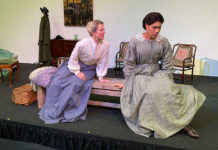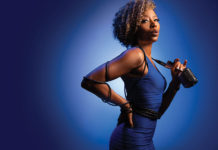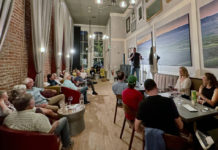On a recent blustery night, there was no better sanctuary in Healdsburg than the warm glow and sonorous sounds emanating from Furthermore Wines Tasting Lounge.
There, hospitality and events manager Marty Paradise not only evinces a fine palate for wine but a well-developed ear for talent. The perfect pairing on the night in question was Furthermore’s supple 2018 Gap’s Crown pinot noir and the virtuosic Bay Area music duo Megan Schoenbohm and Jason Brentwood, a.k.a. Crescent Moonshine.
The talented twosome bring to life a playlist of ’90s deep cuts and classics—yes, there is such a thing now—via the former’s striking vocals and guitar playing and the latter’s nuanced and affecting percussion.
Between sets, singer-songwriter Schoenbohm (who many may already know as an award-winning children’s artist) indulged a few questions for the following Q&A (edited for length and clarity).
DH: Your interpretations of the material are really strong and interesting—the combination of novelty and the familiar is amazing, such that I’m compelled to ask, why the ’90s?
MS: I really lucked out—I have this memory of being 12 years old, watching the Lilith Fair on pay-per-view in 1997. Sarah McLachlan and Jewel were up on stage, and they were singing ‘Water is Wide,’ and I’m sitting there, 12 years old. I’m watching the screen, and my arms just totally like break out in goosebumps, and I’m like, ‘I don’t care what it takes, but that is what I want to do.’ And that just became it.
DH: When did you start playing guitar?
MS: I went to school as a drummer. I was a music therapy major [Schoenbohm is a graduate of Boston’s Berklee College of Music with a degree in music therapy], and they were like, ‘Well, you know, good luck—you’re going to have to be a guitarist.’ Basically, I learned to play with all the ’90s songs—I would sit and just play all the songs that I liked, and that became my repertoire. And then I started writing my own music.
DH: There’s an interesting sort of split in your music career—you have a separate and successful venture in children’s music (musictimewithmegan.com). Do you feel the same emotional investment as an artist when you’re interpreting a ’90s tune or writing a children’s tune?
MS: I would say the first word that comes to mind is ‘love’… There’s a lot of heart and feeling that goes into what I do. What I say is, ‘I write this music for the kids in our lives and the kids inside all of us.’ I take these things that we’re facing now in this world and [create] these heartwarming messages of self-empowerment and self-love. I take these things that we wish we would have learned when we were kids and I bring them down so that these kids are learning these messages at three and five years old, rather than learning them in their 30s and 40s. It’s also music that I feel like the parents can listen to as well—there’s no ‘Baby Shark.’ I was joking with Jason that it’s like the Ani DeFranco of kids’ music.
DH: What’s it like performing with your partner?
MS: Jason is incredibly patient. He lets me run the show and trusts my vision. He wants to support me unconditionally. But I’ve got to tell you—I’ve always been a solo artist, so when we were dating and he’s like, ‘I’d really love to gig together,’ I was thinking, ‘I’m a solo artist and have always been.’ But, I said, ‘If you want, come along; you can learn the songs.’ He started listening to my albums more than I have. He would sit there and just study all the music and practice. I knew he was talented—he was totally dedicated, and I said, ‘All right, well let’s give it a go.’
DH: It’s a great sound with a lot of dimensionality. I also appreciate how you’re able to take the entirety of a decade’s music which you curate and interpret in a way that’s fresh, vital and relevant. When you choose a song, what is it that you’re looking for, and how do you know this is your song?
MS: Well, first and foremost, I have to feel a connection to it—not just an aesthetic thing, but an emotional connection or just, like, ‘I can kill this song’… How do we make it fresh? How do we make it unique in a way that people are like, ‘Wait, I know that!’ and that differentiates us from just being a cover band… It’s all about creating and facilitating an environment where people are just enjoying themselves. If the music takes them back and brings them into these memories and facilitates some conversation—that they may not have had with the people that they were with—I’m able to take part in that, contributing in that way.
DH: For those of us of a certain generation, ’90s songs are the sound of our youth—in some way, now it’s children’s music for grown children.
MS: Love it.
DH: What do you do if you’re performing in a venue and there are people talking during your performance?
MS: I think to some extent, there needs to be some surrender. You can’t make someone listen or enjoy the song. And, I think when it comes down to it, you just have to continue on with what feels true to me to play. We read the vibe of the room, we play a little bit of this, maybe we switch it up a little bit to that, and you just kind of go with the flow. But for my own sanity, you have to surrender and just know that not everyone’s going to like everything we play. Some people may be like, ‘This sucks,’ and some people like, ‘Oh, my God, this is amazing!’ And you just have to let it go.
Furthermore Wines and Tasting Lounge is located at 328 Healdsburg Ave., Suite A, Healdsburg. For upcoming events, visit furthermorewines.com.








